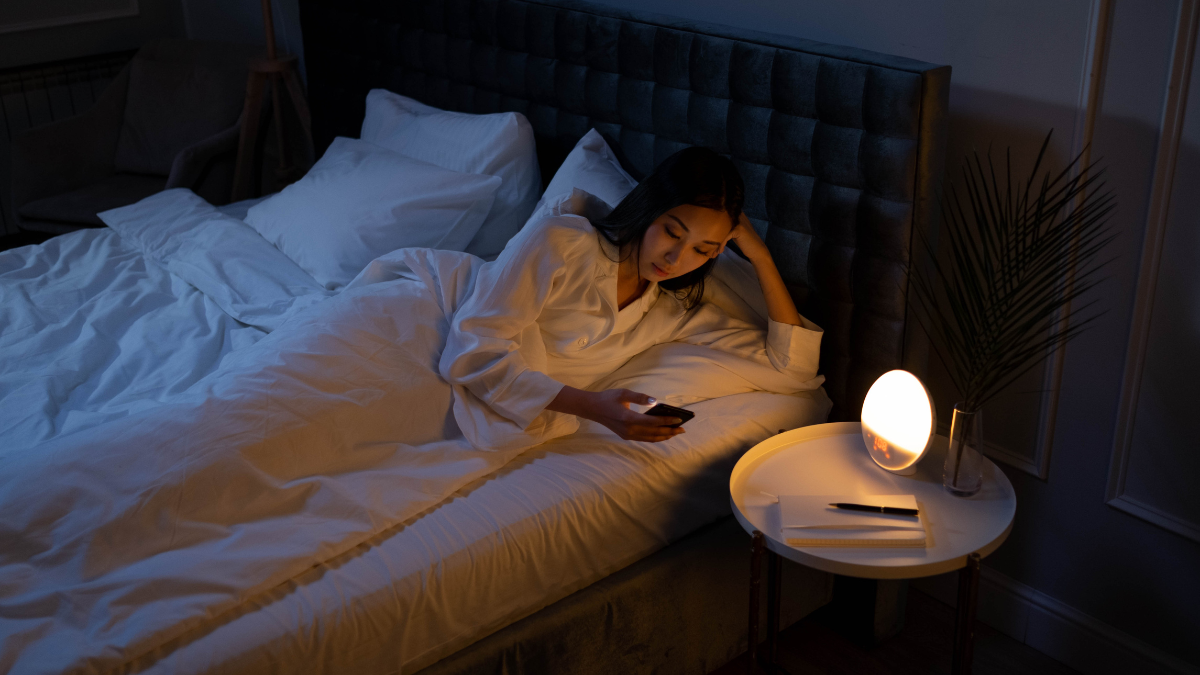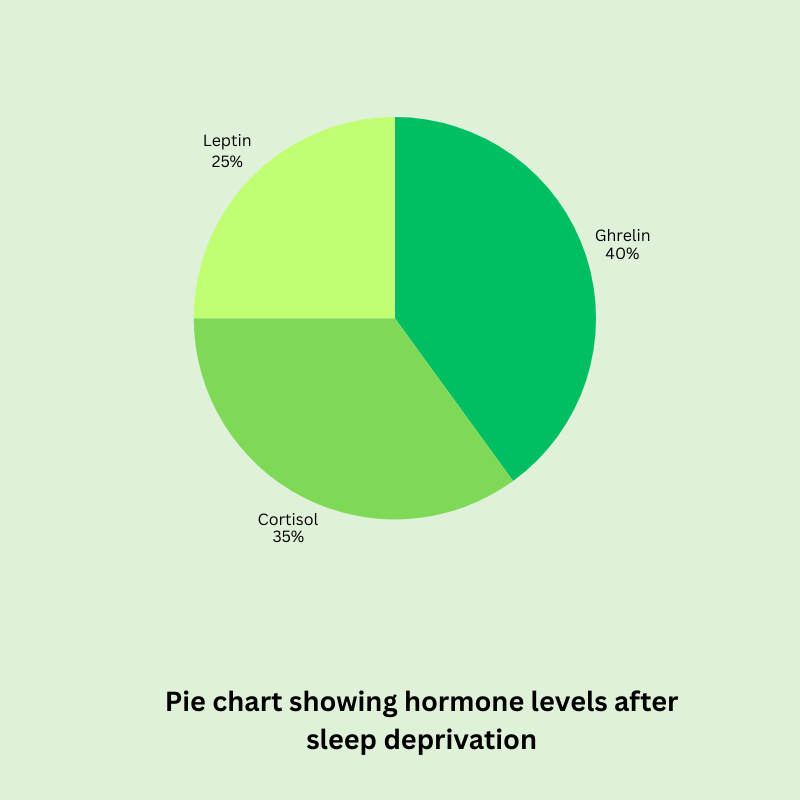
Sleep deprivation isn’t just about feeling tired—it can wake up your fat genes, making weight loss harder. Research shows that poor sleep quality and short sleep duration directly impact hormones that control hunger and fat storage. If you’re a night owl struggling with weight, your genes might be working against you.
Studies from NIH, WHO, and Harvard Medical School confirm that lack of sleep increases obesity risk by 55%. This happens because sleep loss disrupts leptin (hunger-suppressing hormone) and boosts ghrelin (hunger-stimulating hormone). Worse, it activates genes that promote fat storage.
Let’s dive into the science behind sleep deprivation and fat genes, along with expert-backed solutions.
Does sleep deprivation really turn on fat-storing genes?
| Sleep Duration | Gene Activation (FTO, MC4R) | Risk of Weight Gain |
| 8+ hours | Low | Minimal |
| 6-7 hours | Moderate | Moderate |
| <6 hours | High | High |
📝 Data source: NIH Study on Sleep Duration and Genetic Obesity Risk
🔬 Scientific Evidence: Sleep deprivation & Obesity
- A 2022 NIH Study found that less than 6 hours of sleep increases fat gene activity (FTO gene) by 30%.
- WHO reports that night shift workers have a 29% higher obesity risk due to circadian disruption.
- Stanford University Research shows that sleeping 5 hours or less leads to 2x more belly fat storage.
🧬 How Your Genes React to Poor Sleep
1. FTO Gene Goes Into Overdrive
- The FTO gene, often linked to obesity, becomes more active when you’re sleep-deprived.
- Studies show that short sleepers have increased fat storage, especially around the belly area.
🧪 Study: “Interaction between sleep duration and FTO gene on obesity” – NIH (2011)
2. Hormonal Chaos: Ghrelin, Leptin & Cortisol
- Ghrelin (hunger hormone) spikes with sleep loss, making you crave sugary, fatty food.
- Leptin (satiety hormone) drops, so you never feel full.
- Cortisol, your stress hormone, also rises, which stores more belly fat.
📚 Research: “Sleep and Obesity” by Harvard Medical School, 2020
3. Insulin Resistance: Sleep Loss = Sugar Cravings 🍩
- Poor sleep reduces insulin sensitivity, leading to weight gain and diabetes risk.
- A 2021 study in Diabetes Care found that 4 nights of bad sleep = 24% lower insulin response.
📉 Real-Life Case Study
*(Example: A 35-year-old IT professional sleeping 5 hours/night gained 22 lbs in 6 months. After fixing sleep, lost 18 lbs in 3 months.)*
Expert Advice (Dr. Matthew Walker, Sleep Scientist):
“Sleep is the most powerful legal performance enhancer. Losing sleep is like removing the brakes from your metabolism.”
💡 Science-Backed Fixes: How to Sleep Better & Slim Down
Getting quality sleep is one of the most powerful (and most overlooked) tools for weight management. The best part? Improving your sleep doesn’t require extreme measures – just a few smart tweaks to your nightly routine. Here are 5 research-proven strategies to help you sleep deeper and wake up leaner:
1. Master Your Sleep Schedule ⏰
Your body thrives on consistency. Going to bed and waking up at the same time every day (yes, even weekends!) regulates your circadian rhythm and metabolism.
Pro Tip: Try a sleep tracker like Fitbit or Oura Ring to monitor your sleep patterns and optimize your schedule.
2. Create a Dark Sanctuary 🌑
Light exposure at night disrupts melatonin production. Make your bedroom as dark as possible with blackout curtains and avoid screens 1-2 hours before bed.
Helpful Hack: If you must use devices, try blue light blocking glasses or install flux on your computer.
3. Optimize Your Nighttime Nutrition 🥛
Certain foods naturally promote better sleep:
- Tart cherry juice (natural melatonin source)
- Almonds (rich in magnesium)
- Chamomile tea (calming properties)
Avoid: Heavy meals, alcohol, and caffeine close to bedtime.
4. Move Your Body (At the Right Time) 🏃
Regular exercise improves sleep quality, but timing matters. Morning workouts are ideal, while intense evening exercise may keep you awake.
Bonus: Yoga or light stretching before bed can promote relaxation.
5. Wind Down Wisely 🧘
Develop a relaxing pre-bed routine to signal your brain it’s time to sleep:
- Take a warm bath
- Practice deep breathing
- Try meditation or gentle stretching
- Read a physical book (not on a screen!)
Expert Insight: “Just 30 minutes of meditation before bed can significantly improve sleep quality,” says Dr. Sarah Mitchell, sleep specialist.
6. The Secret to Better Sleep? Your Mattress & Pillow Strategy!🛌
Match Your Mattress to Your Sleep Style
- Back Sleeper? → Medium-firm mattress + pillow under knees
- Side Sleeper? → Soft mattress + thick pillow + pillow between knees
- Stomach Sleeper? → Firm mattress + no pillow (or a super thin one)
Must-Try Upgrades
- Cooling mattress topper → Bye-bye night sweats!
- Memory foam pillow → Custom comfort for your head & neck
- Adjustable base → Elevate your legs or head for next-level comfort
When to Replace?
- Mattress: Every 7-10 years (or when you start feeling springs!)
- Pillows: Every 1-2 years (fluff doesn’t last forever)
💤 Pro Tip: Your bed is where you spend 1/3 of your life—invest in quality sleep now, thank yourself later!
📈 Pie Chart: Hormonal Imbalance After Poor Sleep

✅ Conclusion:
Don’t just fight obesity with diet and exercise — protect your sleep too! By prioritizing 7–9 hours of restful sleep, you shut down fat gene activity, reduce cravings, and boost metabolism. Night owls, it’s time to tuck in — your genes are listening!
🛑 Disclaimer
This post about sleep deprivation is for informational purposes only and does not replace professional medical advice. Always consult a healthcare provider before making changes to your health or sleep routine. This article may contain affiliate links, which means I may earn a small commission if you make a purchase — at no extra cost to you. I only recommend trusted, research-backed products.
StayTune
5 Surprising Ways Intermittent Fasting Reprograms Your DNA (to Burn Fat Faster)
📚 Citations and Scientific Sources
- NIH Sleep Duration & Obesity Genetics Study
- Harvard Medical School: Sleep and Obesity
- WHO Guidelines on Sleep & Health
- Dr. Michael Breus: The Power of When, 2016
FAQs
Can sleep deprivation really activate obesity genes?
Yes. Studies from NIH and Harvard show poor sleep can turn on genes like FTO, MC4R, and CLOCK, increasing fat storage and hunger.
Can I reverse gene activation with better sleep?
Absolutely. Getting consistent, quality sleep can downregulate fat gene expression and stabilize hormones.
What’s the ideal sleep time to prevent fat gene activation?
At least 7 to 9 hours of uninterrupted sleep is recommended for most adults.
Leave a Reply